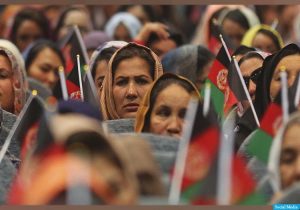Women Need Unity

Some civil society activists believe that peace talk is an opportunity to bring women closer together because of their common aspirations, and that they should use this opportunity to work to increase solidarity among themselves.
In an interview with the CSHRN, Mojgan Saleh, pseudonym, said that peace is one of the most important issues directly related to women’s rights and freedoms, and therefore women can use it as an opportunity. “Women should seize this opportunity to strive for greater solidarity among themselves, and create justice movements, greater than before regardless of the issues; such us ethnicity or language to defend their rights and freedoms.” She said.
CSHRN: Can Afghan women create movements?
Salehi: All Afghan women do not have the same concern. Unfortunately, most women in the country are now deprived of their basic needs and natural rights. They far from establishing a movement. But women living in a better situation, or who have been able to take advantage of educational opportunities, must work to create such movements. It is their mission to work for the betterment of themselves and their fellow human beings. I hope that after the peace agreement, the situation of women in all parts of the country will improve and, in addition to access to the most basic rights, they will have more opportunities to improve their capacity.
CSHRN: What are the most important issues related to women that should be among the priorities of the peace talks?
Salehi: Women rights should be prioritized. It is a fundamental issue in all countries. Religious teachings have also emphasized women’s rights and giving them opportunities in social activities for society’s prosperity. Therefore, the protection of women’s rights and dignity should be considered as a value. Everyone should consider themselves obliged to this value and work to protect women’s rights.
CSHRN: Will the presence of women in peace talks affect the Taliban’s view of women?
Salehi: The Taliban’s position is not clear with regards to women’s rights yet. On the other hand, one of the latest UNAMA reports shows that Afghanistan is the worst country for women. So, there is still violence against them. Sustainable peace, on the other hand, requires equal participation of all citizens, men and women, in various areas of society. The role and participation of women is an important and fundamental part of lasting peace, and the fact that women are directly involved in the peace process with the Taliban and can better defend their rights which raises hopes for a positive impact.
CSHRN: Apart from security concerns and the opposition of the Taliban, what other issues in society are considered obstacles to women’s progress?
Salehi: obstacles to women’s progress are divided into two categories, internal and external. Lack of self-confidence is among the internal obstacles. Patriarchy, strict families, and misconceptions about women, including their lack of need for a job are external obstacles.
CSHRN: What is your prediction of the outcome of the peace talks?
Salehi: Overall I am optimistic about the outcome of the peace process. I hope that lasting peace is achieved so that all citizens can work for the progress of the country.
She said that despite hopes for the outcome of peace talks, there are sometimes concerns. She added that one of the concerns is that the rights of minorities and women will be violated as a result of the peace agreement.